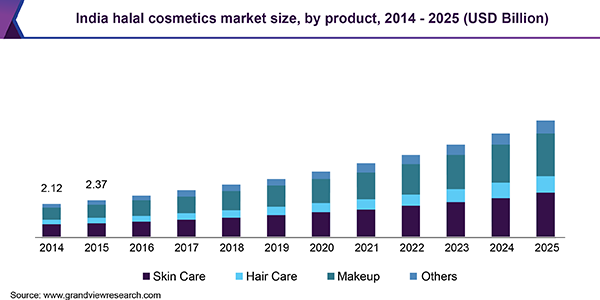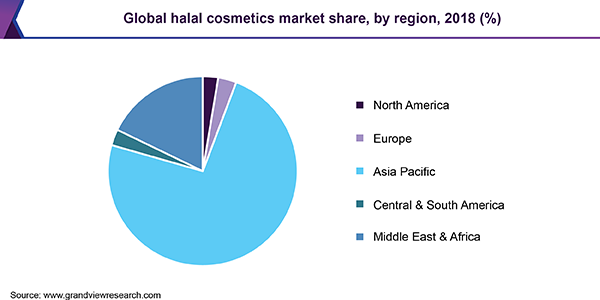Industry Insights
The global halal cosmetics market size was estimated at USD 23.03 billion in 2018 and is projected to expand at a CAGR of 12.3% over the forecast years. Considerable Islamic population base across the globe that is willing to pay premium prices for Halal-certified beauty products is anticipated to drive the product demand over the forecast period. Growing awareness regarding the use of cosmetic products is also likely to be one of the key factors driving the market. Since Muslims constitute a considerable part of the global population, thus the mainstream cosmetic industry is now focusing on the development of halal-certified products. As a result, manufacturers have started introducing Sharia-compliant products.
India has a high Islamic population and ranks third in the world. Rapid urbanization and growing standards of living have boosted the cosmetics market in India. Apart from the domestic market, India is also considered to be the hub of exports for halal products from the UAE, Bangladesh, Saudi Arabia, and Malaysia. Information regarding the ingredients used in cosmetics is not easily available at times and brands often lack transparency with their customers.

Health-related diseases, such as genital abnormalities and breast cancer, caused by cosmetics have given rise to various concerns regarding the ingredients. In many countries, manufacturers use lard or pork as a cheaper substitute for oil. The use of lard is a serious offense for Abrahamic religions such as Islam and Judaism. Hence, several detection techniques have been introduced for detecting the presence of fats, oils, and gelatin in cosmetics. Some technologies include Fourier Transform Infrared (FTIR) spectroscopy and Gas Chromatography-Mass Spectrometry (GCMS).
Growing demand for Halal-certified and Sharia-compliant product is also boosting the market growth. Although the production costs of halal cosmetics are usually higher than regular products, consumers are willing to pay extra due to their strong religious beliefs. Majority of the Major Muslim populated countries, such as Pakistan and Arab countries, are developing, price-sensitive economies. Regional manufacturers have therefore developed small packaging products at lower costs to avoid a one-time investment.
Product Insights
Rising awareness regarding the benefits of using skincare products is anticipated to drive the skincare segment growth. Most cosmetics contain ingredients that cause skin irritation and may have a long-term effect on health. As a result, halal cosmetics have proven to be an alternative and effective solution for consumers. Increasing disposable income coupled with the adoption of modern lifestyle is presumed to be the major factor behind the segment’s development.
There are some vegan varieties that extend the market opportunity for the non-Muslim population as well. For example, Eco trail, an Indian company and U.K.-based PHB Ethical Beauty offer products that are not only Halal certified but also cruelty-free and free from harmful substances. This trend is being followed by leading global brands, such as The Body Shop and Forest Essentials, which, in turn, is supporting the market expansion.
Regional Insights
Southeast Asian region is projected to witness the most lucrative growth over the forecast period. Factors, such as a rise in spending on personal care products, awareness regarding the hazards of transdermal cosmetics, and demand for eco-friendly cosmetics have fueled the product growth in this regional market. Cosmetic companies present in this region are trying to consolidate their position by offering a wide range of products. Companies are leveraging the reach of social media for spreading awareness among the customers and to connect with their target audiences (young adults and female customers).

The primary factor driving demand in the Europe market is the unique packaging style developed by Dutch entrepreneurs, who started the idea of halal cosmetics in this region. The market has witnessed significant growth in western countries, such as U.S. and European Union countries, owing to the increasing Muslim population and their need for safe and naturally manufactured beauty products.
Halal Cosmetics Market Share Insights
Companies in the market are spending high amounts on promotional activities spreading awareness about the benefits of using halal beauty products. There has been a promotion of prestigious cosmetic brands in local magazines in Malaysia. Some of the prominent industry participants are Martha Tilaar Group, Clara International, Wipro Unza, Paragon Technology and Innovation, and Ivy Beauty Corporation Sdn Bhd. The other manufacturers are Saaf Skincare, Prolab Cosmetics, TALENT Cosmetic Co. Ltd, and PHB Ethical Beauty.
Report Scope
|
Attribute
|
Details
|
|
Base year for estimation
|
2018
|
|
Actual estimates/Historical data
|
2014 - 2017
|
|
Forecast period
|
2019 - 2025
|
|
Market representation
|
Revenue in USD Million and CAGR from 2019 to 2025
|
|
Regional scope
|
North America, Europe, Asia Pacific, Central & South America, and Middle East & Africa
|
|
Country scope
|
U.S., Canada, Germany, France, U.K., China, India, Malaysia, Indonesia, Japan, Brazil, Saudi Arabia, Kuwait, and UAE
|
|
Report coverage
|
Revenue forecast, company share, competitive landscape, growth factors and trends
|
|
15% free customization scope (equivalent to 5 analyst working days)
|
If you need specific information, which is not currently within the scope of the report, we will provide it to you as a part of customization
|
Segments Covered in the Report
This report forecasts revenue and volume growth at global, regional, and country levels and provides an analysis of the latest industry trends in each of the sub-segments from 2014 to 2025. For the purpose of this study, Grand View Research has segmented the global halal cosmetics market report on the basis of product and region:
-
Product Outlook (Revenue, USD Million, 2014 - 2025)
-
Skin Care
-
Hair Care
-
Makeup
-
Others
-
Regional Outlook (Revenue, USD Million, 2014 - 2025)
-
North America
-
Europe
-
Asia Pacific
-
China
-
India
-
Malaysia
-
Indonesia
-
Japan
-
Central & South America
-
Middle East & Africa













